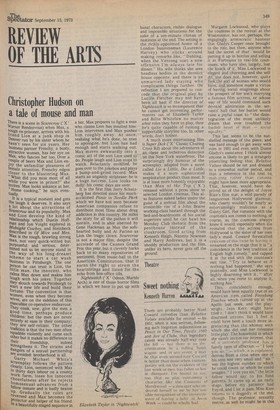REVIEW OF THE ARTS
Christopher Hudson on a tale of mouse and man
There is a scene in Scarecrow (' X ' Warner Rendezvous) when Max, a tough ex-prisoner, arrives with his friend Lion at a junk shop in benver run by his sister whom he hasn't seen for six years. Her business partner Frenchy, a busty, attractive woman, has her eye on Max, who fancies her too. Over a couple of beers Max and Lion enjoy the unfamiliar pleasures of female attention. Frenchy edges Voser to the blustering Max. What did you miss most of all While you were in prison?" she !nvites. Max looks askance at her. 'Home cooking," he says eventually. It is a typical moment and gets the laugh it deserves. It also says a lot about the attractions of Scarecrow and its popularity. Max and Lion develop the kind of relationship which Dustin Hoffman arid Jon Voight explored in Midnight Cowboy, and Steinbeck described in Of Mice and Men. Max is the tough, brawling strong Inan, not very quick-witted but Purposeful and serious, determined not to let anyone stand in the way of his long-dreamt scheme to start a car wash business in Pittsburgh. The one person he can trust is Lion, the little man, the innocent, who calms Max down and makes him laugh with his jokes. Together they slouch towards Pittsburgh to start a new life and build their fortune. The convention is that women, even when they become Wives, are on the sidelines of this masculine co-operative endeavour. They cook, sew, give the men a good time, perhaps produce children: but the men are never entirely at ease in their company; they are self-reliant. The other tradition is that the two men often squabble violently and curse each Other but it makes no difference to their friendship, indeed strengthens it. The strains and dangers of a sexual partnership are avoided: brotherhood is all. Garry Michael White's screenplay follows the pattern Closely. Lion, sentenced with Max to thirty days labour on a county Work farm, loses his innocent cheerfulness after he rejects homosexual advances from a fellow inmate and is badly beaten Up. Gradually the roles are reversed and Max becomes the protector and helper of his friend. In a beautifully-staged sequence in
a bar, Max prepares to fight a man who claims Lion has insulted him. Lion intervenes and Max pushes' him roughly away. At once, realising what he's done, he tries to apologise, but Lion has had enough and starts walking out. Max moves awkwardly into a comic act of the sort Lion used to do. People laugh and Lion stops to watch. Reluctantly mollified, he goes over to the jukebox and plays a bump-and-grind record. Max starts an ungainly striptease: he is a huge success. Lion looks on dully: his comic days are over.
It is the first film Jerry Schatzberg has directed since his muchacclaimed Panic in Needle Park which we have not seen because American companies refuse to distribute most films about drug addiction in this country. He milks the story for all the pathos it will sustain, and is able abetted by Gene Hackman as Max the softhearted bully and Al Pacino as Lion the tragic clown. Scarecrow is not a major film, despite the
accolade of the Cannes Grand Prix this year, but it cleverly harks back to so many repositories of sentiment, from music-hall to the American Constitution, that It earns the right to strum the heartstrings and listen for the echo from box-office tills.
Nightwatch (' X ' Odeon, Marble Arch) is one of those horror films in which we have to put up with banal characters, risible dialogue and impossible situations for the sake of a ten-minute climax of nastiness at the end. The setting is the richly-appointed home of a London businessman (Laurence Harvey) who slicks around making remarks like, " Dahling, when the Vietcong start a new offensive I'm always late for dinner." His wife thinks she sees headless bodies in the derelict house opposite, and there is an unmarried lady staying who complicates things further. On reflection I am prepared to concede that the original play by Lucille Fletcher may not have been all bad: if the director of Nightwatch is so incompetent that he cannot get interesting performances out of' Elizabeth Taylor and Billie Whitelaw no matter what roles they have to play, then he's quite capable of ruining a supportable storyline too. In other words, don't bother.
A much more entertaining film is Super Dick C X' Classic Charing Cross Rd) about the adventures of an obese and lecherous detective on the New York waterfront. The surprisingly dry humour of the screenplay, adapted from a novel called Lie a Little, Die a Little,
makes it a more sophisticated sexploitation product than most. It is at least more honestly enjoyable
than Man at the Top (' X ')
released without a press show to selected London cinemas. This al so features naked ladies under the guise of a serious film about the irresistible rise of a John Braine working-class bastard through the bed-and-boardrooms of his social ' superiors until he can bawl his Monday Club rhetoric from the penthouse instead of the cloakroom. Good acting from Kenneth Haigh, Nanette Newman and Harry Andrews, but it is a shoddy production and the film, unlike its hero, never gets off the ground.
































 Previous page
Previous page